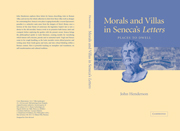Book contents
- Frontmatter
- Contents
- Acknowledgements
- Introduction
- 1 Twelve steps to haven
- 2 Dropping in (it) at SENECA'S
- 3 You can get used to anything
- 4 The long and winding mode
- 5 Booking us in
- 6 Now and then; here and there: at SCIPIO'S
- 7 Bound for VATIA'S
- 8 Knocking the self: genuflexion, villafication, VATIA'S
- 9 The world of the bath-house: SCIPIO'S
- 10 The appliance of science: SCIPIO'S
- 11 Shafts of light: transplantation and transfiguration
- 12 Still olive, still SCIPIO'S
- Appendix 1 Here to stay Places and persons named in the Epistulae Morales
- Appendix 2 From: Letter 86 To: A Dying Light in Corduba
- Bibliography
- Indexes
8 - Knocking the self: genuflexion, villafication, VATIA'S
Letter 55
Published online by Cambridge University Press: 22 September 2009
- Frontmatter
- Contents
- Acknowledgements
- Introduction
- 1 Twelve steps to haven
- 2 Dropping in (it) at SENECA'S
- 3 You can get used to anything
- 4 The long and winding mode
- 5 Booking us in
- 6 Now and then; here and there: at SCIPIO'S
- 7 Bound for VATIA'S
- 8 Knocking the self: genuflexion, villafication, VATIA'S
- 9 The world of the bath-house: SCIPIO'S
- 10 The appliance of science: SCIPIO'S
- 11 Shafts of light: transplantation and transfiguration
- 12 Still olive, still SCIPIO'S
- Appendix 1 Here to stay Places and persons named in the Epistulae Morales
- Appendix 2 From: Letter 86 To: A Dying Light in Corduba
- Bibliography
- Indexes
Summary
It sticks out a coastal mile that the two manors, scipio's and vatia's, speak specially intimately and intricately to one another. They are more than imbricated, they generate their significance from interaction. For they interlock, to the death and past it, in a showdown between conflicting ‘Philosophies’ of life. Seneca takes and makes two memories and memorials, and polarizes them as con and authenticity. Out with lapse into modernity, and in with modification of traditionality. Expose political to spiritual exposé. Explode popular views, introduce theorizing in tandem.
In short, Seneca will lure out the Epicureanism lurking in his Stoicism. The Letters were so magnanimous, they got launched with clips from Epicurus' greatest hits. But for all their generosity, they are working hard through the glitz to the metal. And the collection will wind up beaming out Thoughts for the Day from seneca's own website. Musing at scipio's will find a classic persona for Seneca in ‘retirement’. Not some latter-day Maecenas frivolité, but honourable autonomy to satisfy an Elder Cato. A political strategy due for reclamation as spiritual sanctuary. But first Epicurean sloth must be scraped and peeled away from Roman sublation. That is why we went to suss out vatia's first. Seneca takes us for a ride, so later he can catch us lying down.
For if any of us escapists thought we might settle down and find rest that easily, then they were hawking hand-me-down dogma that as good as prescribes coma as remedy for living.
- Type
- Chapter
- Information
- Morals and Villas in Seneca's LettersPlaces to Dwell, pp. 67 - 92Publisher: Cambridge University PressPrint publication year: 2004



